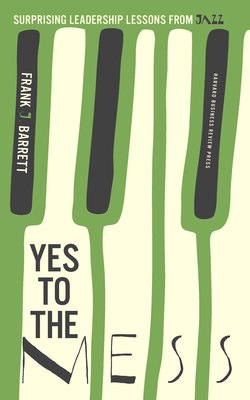Читать книгу Yes to the Mess - Frank J. Barrett - Страница 8
На сайте Литреса книга снята с продажи.
ОглавлениеACKNOWLEDGMENTS
Thanks to my brainstorming friends and colleagues who have helped me clarify my thinking and offered insight and encouragement over the years—my deepest gratitude to Ken Gergen, Mary Gergen, Karl Scheibe, Sheila McNamee, the late Barnett Pearce, the late Ted Sarbin, Marc Ventresca, Ed Schein, David Cooperrider, Ronald Fry, Bill Pasmore, Richard Boyatzis, Karl Weick, Mary Jo Hatch, Richard Doyle, Jean Bartunek, Joe Rubel, Sarah Johnson, and Sonia Nevis.
I deeply value my two years as a Visiting Scholar at Harvard Business School and the Harvard Program on Negotiation. I especially thank my sponsors, Mike Wheeler and Amy Edmondson. It was at Harvard that I first envisioned and began working on this book. I had many seminal conversations with Mike, Amy, and others at HBS, especially Andreea Gorbatai, Dutch Leonard, Clay Christensen, Mike Tushman, Ethan Bernstein, and Colin Fisher. I am grateful, too, for the inspirational conversations I had with my friends and colleagues at Harvard Graduate School of Education and Harvard Faculty of Arts and Sciences, especially Richard Hackman, Bob Kegan, Monica Higgins, Laura Crandall, Lissa Young, Sean Kelly, Larry Susskind, Kim Leary, and Jane Juliano.
Thanks to my friends and colleagues who’ve read and commented on earlier versions of this manuscript—especially Ed Schein, Bill Van Buskirk, Marty Kaplan, Kyle Johnson, Ralph Carney, Richard Boyatzis, Herbert Anderson, Bill Pasmore, Michael Fish, and Karl Weick.
Thanks also to my colleagues at the Naval Postgraduate School who offered helpful comments and critiques on earlier drafts, especially Reuben Harris, Nick Dew, Wayne Porter, Nancy Roberts, Kishore Sengupta, Tarek Abdel-Hamid, Jim Suchan, and David Franta.
To my friends and colleagues at Fielding Graduate University, especially Jeremy Shapiro, Mike Manning, Charlie Seashore, Charles McClintock, Judy Stevens-Long, Pamela Meyer, and Cate Creede—thank you for working to keep me humble. I’m trying.
A very special thanks to Mike Wheeler from Harvard Business School. Mike’s friendship and support have been invaluable. He saw the potential for this book before I did and continued to remind me of its potential, especially in those moments when I was losing sight of my goal. For Mike, friendship is a highly developed art, and he practices it with craftsmanlike skill. Chapter 6 is about the role of “comping,” supporting others to do their best work. It is dedicated to Mike.
Thanks to those who helped me get these ideas from proposal to manuscript—Rafe Sagalyn and Shannon O’Neill. Thanks also for the wonderful editing of Howard Means, who kept me from hiding behind academic clichés, helped me develop a practitioner’s voice, and provided much-needed clarity on several occasions.
Thanks to the staff at Harvard Business Review Press and especially my editor, Jeff Kehoe, for his appreciative eye (and musical ear) and for advising me from the earliest stages to help move this project forward. I have enjoyed our partnership and look forward to further opportunities to collaborate.
Thanks to my family and friends for encouraging me and for being understanding, especially during those times when I wasn’t available and not in the best of moods.
Thanks especially to my friends who’ve come to understand the challenges of being an introvert who’s occasionally thrust into public roles. I’m trying to get better. Thanks for your patience.
A special thanks to Doug Conant, recently retired CEO of Campbell Soup, who models what it means to be a leader devoted to helping others learn and develop.
I would like to thank my students, especially the officers at the Naval Postgraduate School. You have been, and continue to be, my teachers.
I’d like to thank all of those musicians who inspired me over the years. First and foremost I acknowledge the influence of my first mentor, the great ragtime pianist, Arthur E. Hagan—my grandfather. He showed me that you can lift the mood of any group (or family) with a good song. And if there’s no piano on hand, a good sense of humor will suffice. I hope I can carry his influence forward.
I’d like to acknowledge all of those musicians who have devoted their lives to playing jazz. You have been called to a special profession, and I hope that you reap some of the blessings you bestow on your listeners. My earliest jazz inspirations—Oscar Peterson, Duke Ellington, Thelonius Monk, Bill Evans, Herbie Hancock, and Keith Jarrett—are deserving of my special thanks and acknowledgment. Later in this book I say some things that are critical of Oscar Peterson, but these remarks pale in comparison to my deep admiration for him and for his playing.
Thanks to those musicians with whom I’ve played over the years and who have sharpened my ear and improved my technique. There are simply too many to mention. In jazz, as in most things, I was a late bloomer; I didn’t begin playing jazz until I was twenty-six. I must specifically acknowledge the first jazz musician I ever played with—Ken Peplowski. What a lucky moment that was. I had a few glimpses then of how fortunate I was to play with such a gifted musician who consistently pushed me to play beyond my capacity. Little did I know then that Ken was destined for such accomplishment. Most recently I’ve been honored to play with my friend and colleague Colin Fisher, assistant professor of management at Boston University. I look forward to many more collaborations with this gifted friend. To all those with whom I’ve shared the bandstand—thank you. These learning experiences have been joyous, occasionally transcendent, sometimes painful, always humbling, and the catalyst for my own reflections and theory building.
